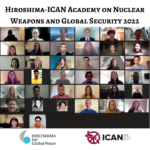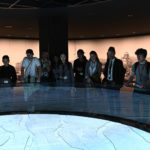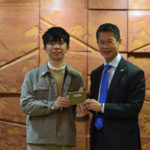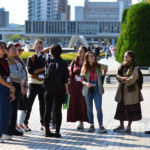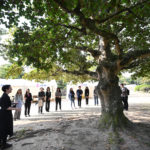Hiroshima-ICAN Academy on Nuclear Weapons and Global Security 2023 – Online Learning and Webinar Session
A total of six webinar sessions were held on Wednesday 4, Friday 6, Wednesday 11, Thursday 12, Friday 13, and Tuesday 31 of October.
During the webinar sessions, participants heard lectures and exchanged ideas from invited NGO members and university professors on the impact of nuclear weapons, their risks, and their relevance to civil society.
Wednesday, October 4 Webinar#1
Theme : Humanitarian and environmental consequences of nuclear weapons, weapons without regard for human rights (Humanitarian and environmental consequences of nuclear weapons)
The first webinar session featured Ms. Koko Kondo, a hibakusha (a survivor of either of the atomic explosions at Hiroshima or Nagasaki in 1945), and Ms. Mary Dickson, a survivor of radiation exposure due to nuclear testing in the United States.
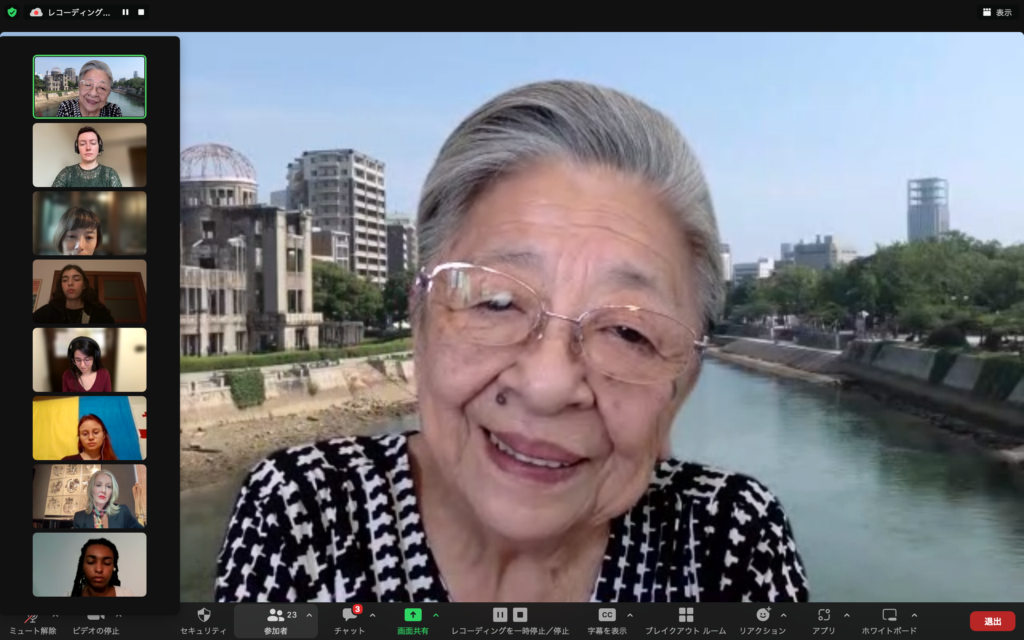
Ms. Koko Kondo shared her story of being exposed to the atomic bomb at an early age (8 months old) and her experience of meeting the co-pilot of the Enola Gay, the aircraft that dropped the bomb, and seeing his suffering and losing the one-sided hatred she had held toward the United States.
During the Q&A session after the talk, in response to a participant’s question about how to overcome the hatred caused by the war, Ms. Kondo said that we should imagine that even if we hate each other, we each have our own feelings, and that the only way to understand each other and overcome the hatred is to make an effort to understand each other.
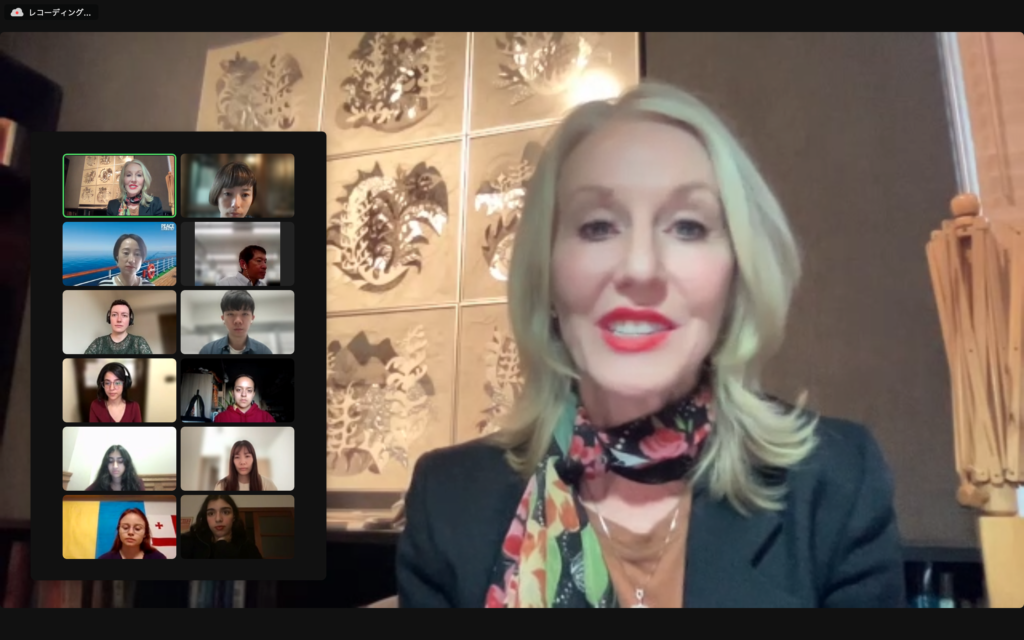
Ms. Mary Dixon shared her experience of losing her family and relatives due to the effects of radiation from nuclear tests in the U.S. and her own experience of suffering from cancer.
She then conveyed the message that the experiences of the hibakusha are a warning that the mistakes of the past must never be repeated and that nuclear weapons must never be detonated again, and that she hopes these stories will be passed on to future generations.
Friday, October 6 Webinar#2
Theme : Nuclear risks and emerging technologies
This day’s webinar session featured Ms. Julia Cournoyer of the Royal Institute of International Affairs (RIIA), also known as Chatham House, who spoke about the nuclear risks we face today and the impact of emerging technologies on nuclear weapons issues and security.
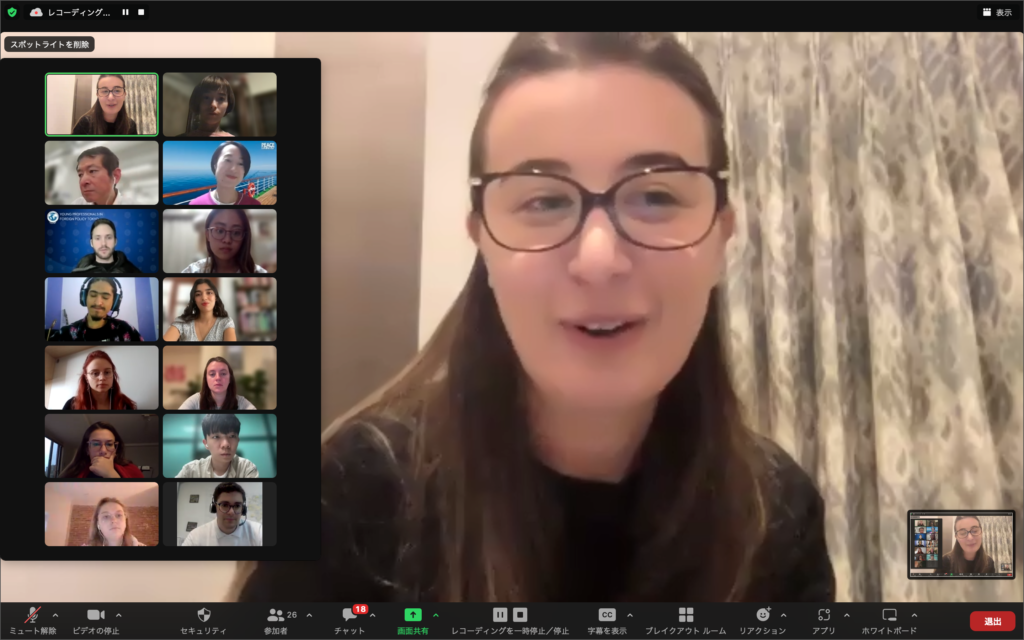
Cyber technology was cited as an example of emerging technology, and we learned that there have been cases where conventional wisdom has been unable to deal with attacks caused by these technologies, and that new technologies may increase nuclear risks by raising the issue of contingencies caused by the evolution of AI. Participants also discussed and shared ideas with each other on how to proceed with policy changes and other measures to stabilize the new technology.
Wednesday, October 11 Webinar#3
Theme : The impact of nuclear weapons on our society, economy, and environment (The impact of nuclear weapons in our society, economy and the environment)
This day’s webinar session featured two speakers who taught us about the impact of nuclear weapons on our society, economy, and environment.
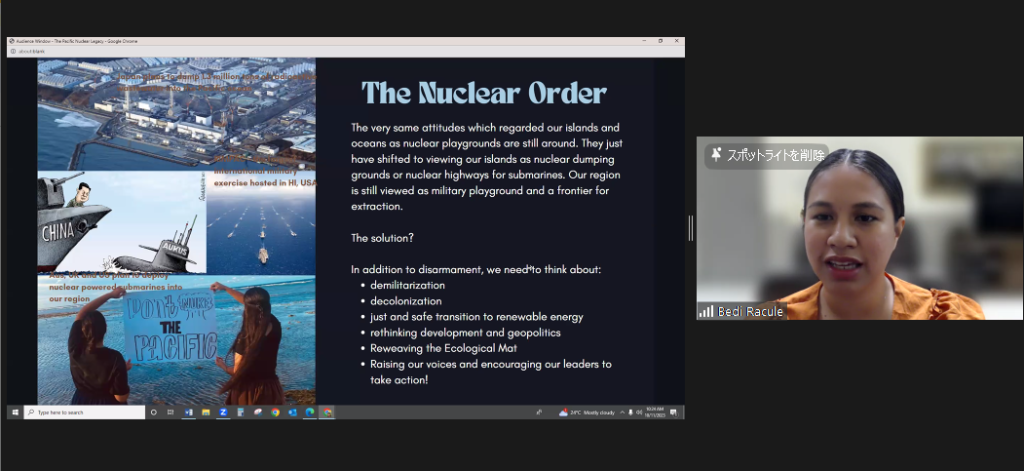
First, Ms. Bedi Racule, a native of the Marshall Islands and founder of a Fijian nuclear youth organization MIISA4thePacific, gave a lecture on the environmental and social effects of nuclear testing, using the Marshall Islands, a former nuclear test site, as an example. The participants seemed shocked to hear that there are still people suffering from the effects of radiation around the area that was once used as a nuclear test site, something that is rarely discussed internationally today.
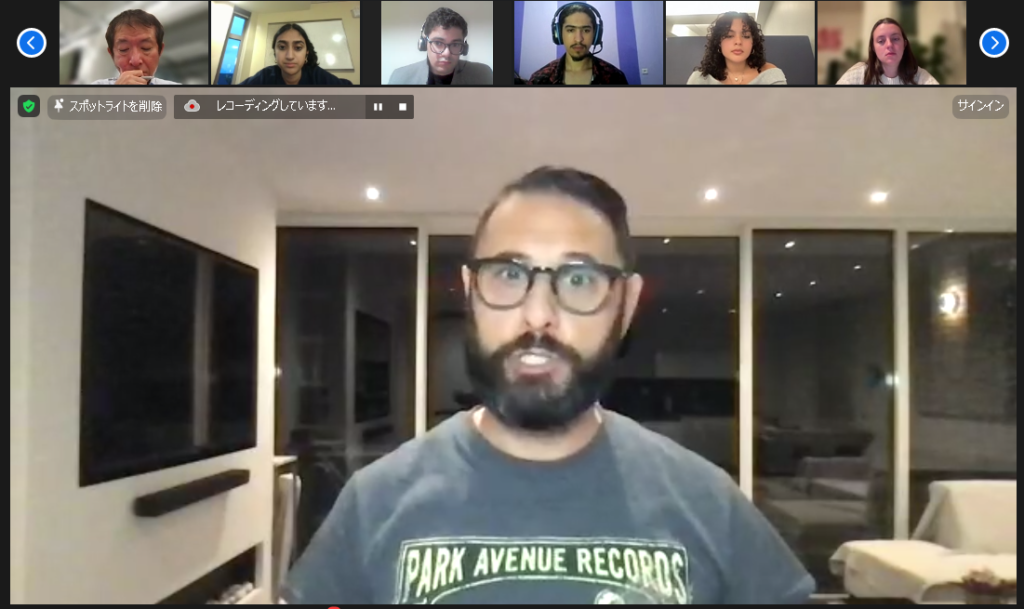
Next, Dr. Vincent Intondi, Professor of History at Montgomery College, historian, and author, gave a lecture on the relationship between nuclear weapons, ethnicity, and colonialism.
He touched upon the people of color and colonies that have been at the mercy of the superpowers’ policies regarding nuclear weapons, from public opinion in the U.S. when the atomic bombs were dropped and the relationship between the civil rights movement including Martin Luther King, Jr. and nuclear weapons, to the relationship between colonies and nuclear testing and the opposition movements against it, etc. He then explained how people of color have faced nuclear weapons in the past, citing the fact that the Global South is now leading the way on the Treaty on the Prohibition of Nuclear Weapons (TPNW). In this context, he conveyed the importance of continuity, saying that even if something seems impossible to achieve, each of us must have faith and continue our efforts, which will lead to great results.
Thursday, October 12 Webinar#4
Theme :The role of civil society for global security (The role of civil society for global security)
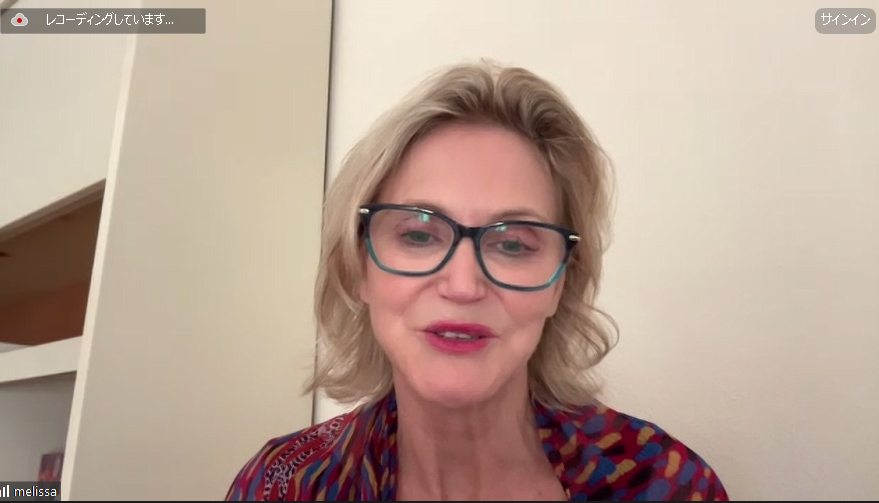
During this day’s webinar session, Ms. Melissa Parke, Executive Director of the International Campaign to Abolish Nuclear Weapons (ICAN), gave a lecture on the role of civil society for global security.
She explained how citizens can be involved in security in a situation where the nuclear weapon states have spent an enormous $83 billion to develop nuclear weapons and build up their nuclear arsenals, citing various examples based on her experience as a former member of the Australian Parliament. In particular, she stressed the importance of thinking about how to approach the campaign, making it more accessible, and continuing to speak out.
Friday, October 13 Webinar#5
Theme : Nuclear risks in the changing world
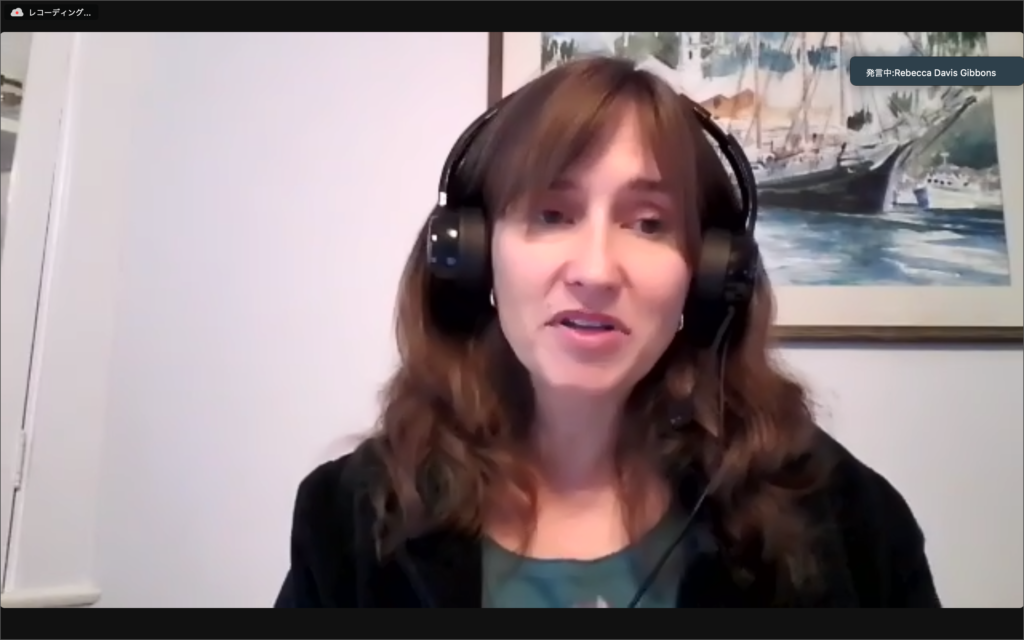
This day’s webinar session was presented by Dr. Rebecca Davis Gibbons, Associate Professor of Political Science at the University of Southern Maine, on nuclear disarmament and nonproliferation in the world, and the past and future of nuclear order.
Looking back on the history of nuclear weapons, which began with the atomic bombings of Hiroshima and Nagasaki in 1945, participants discussed among themselves what the Treaty on the Non-Proliferation of Nuclear Weapons (NPT) should be like in the future, taking into account the fact that the number of nuclear weapon states, which was expected to continue increasing with the development of nuclear technology, has been limited to nine since the establishment of the NPT regime, and that there are many criticisms of the current NPT regime.
In their discussions, participants engaged in lively debate, examining how sustainable the NPT will be in the long term, whether it reflects the current actual security situation, and whether the NPT is working to manage current nuclear risks in the first place.
Tuesday, October 31 Webinar#6
Theme : About the United Nations, the SDGs, and nuclear disarmament (The United Nations, the SDGs and nuclear disarmament)
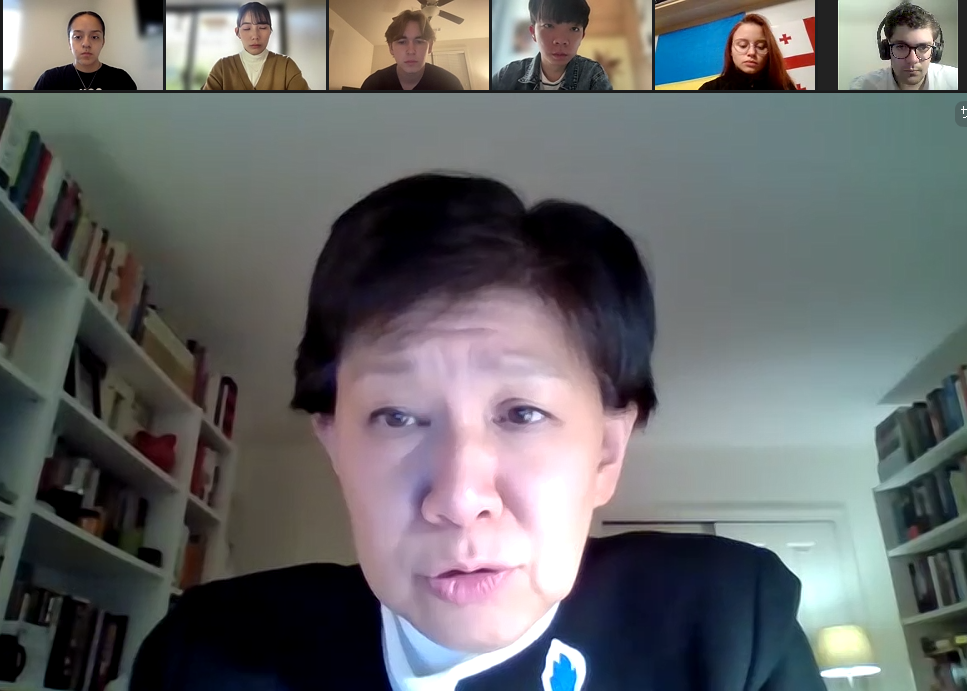
This day’s webinar was conducted after the Hiroshima session. Ms. Izumi Nakamitsu, Under-Secretary-General and High Representative for Disarmament Affairs of the United Nations, gave a lecture on the role of the United Nations, the SDGs, which the UN is currently promoting, and the future direction of nuclear disarmament.
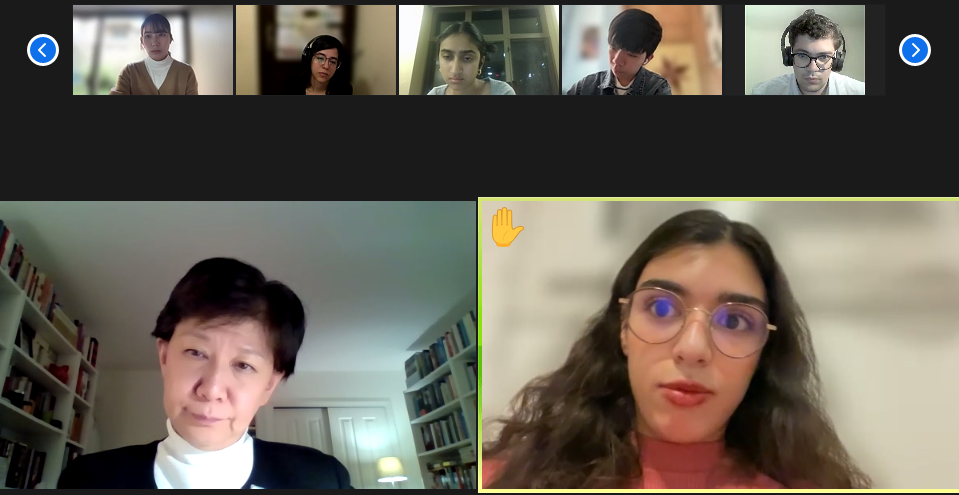
She explained to the participants that the danger of nuclear weapons being used in wars is increasing and that discussions on nuclear disarmament need to be held as soon as possible. She also explained the relationship between nuclear disarmament and the SDGs, and engaged in a lively discussion with the participants on the future role of the UN.
Hiroshima Session
Tags associated with this article



